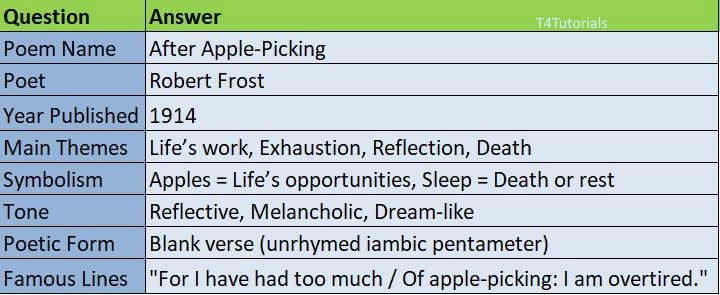Summary:
“After Apple-Picking” is a lyric poem by Robert Frost, first published in 1914 in North of Boston. The poem is a reflection on life, work, and exhaustion, using the metaphor of apple-picking to explore deeper themes of ambition, fulfillment, and mortality.
The speaker, a weary apple-picker, has completed his harvest but is tired and drowsy, drifting between wakefulness and sleep. He reflects on the apples he has picked and those he has missed, symbolizing opportunities taken and lost. The poem suggests a transition between life and death, as the speaker wonders whether his sleep will be just ordinary rest or the eternal sleep of death.
Frost’s use of imagery, dream-like tone, and symbolism makes the poem open to multiple interpretations. It can be seen as a meditation on the cycle of life, the burden of work, or the inevitability of aging and death.

Score: 0
Attempted: 0/10
Subscribe
| Question | Answer |
| Poem Name | After Apple-Picking |
| Poet | Robert Frost |
| Year Published | 1914 |
| Main Themes | Life’s work, Exhaustion, Reflection, Death |
| Symbolism | Apples = Life’s opportunities, Sleep = Death or rest |
| Tone | Reflective, Melancholic, Dream-like |
| Poetic Form | Blank verse (unrhymed iambic pentameter) |
| Famous Lines | “For I have had too much / Of apple-picking: I am overtired.” |